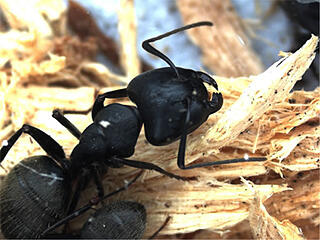You're cooking dinner in your kitchen, when all of a sudden you notice an ant walking across your counter top. You squash it and get back to cooking, when out of the corner of your eye, you notice

another. And another ... and another ...
This is so common in Massachusetts homes. But why do ants come inside during the summer? There are many factors that lead to an interior ant infestation. To understand why ants are in your home, we should first understand a little about ant biology and behavior, as well as the conditions that allow them to thrive.
THE ANTS ARE MARCHING
Ants are continuously foraging for sources of food in order to feed and expand their colony. Scout ants are on the lookout, and when they do encounter a viable food source, they'll signal to other members of the colony to join the feast. By leaving a pheromone trail that's easy to follow, other ants are able to quickly find this new food source.
WHAT'S FOR DINNER?
Ants need protein to survive, but the question is, where do they find it and what's the source? Outside, ants consume protein from blooming plants, which is why they become increasingly active in the spring. They also need water, which may be abundant outside, depending on the weather conditions.
But many factors may cause them to move inside your home to find these same sources of food. For example, if there's condensation that's built up in an interior wall void, that's a condition that's ideal for a colony to survive and even thrive. Areas in your home that are prone to moisture buildup, such as bathrooms, basements, and kitchens are common areas for ants to nest. If you've ever spilled something sweet on your counter, you know that ants will be on it within minutes. The same thing happens inside kitchen cabinets when sugary food or liquid is open.
HOW TO EXTERMINATE ANTS IN MASSACHUSETTS
At Burgess Pest Management, we always inspect for the source of the infestation. If we're able to locate the nest of an ant colony, it's a lot easier to remove the problem. In most cases, our team uses highly effective gel baiting products, which essentially leverage ant biology and behavior to eliminate the colony. Since ants are sharers, they'll consume the gel bait and share it with the rest of the colony, including the queen. Massachusetts ant control requires an experienced professional to inspect, detect, and correct the problem.


